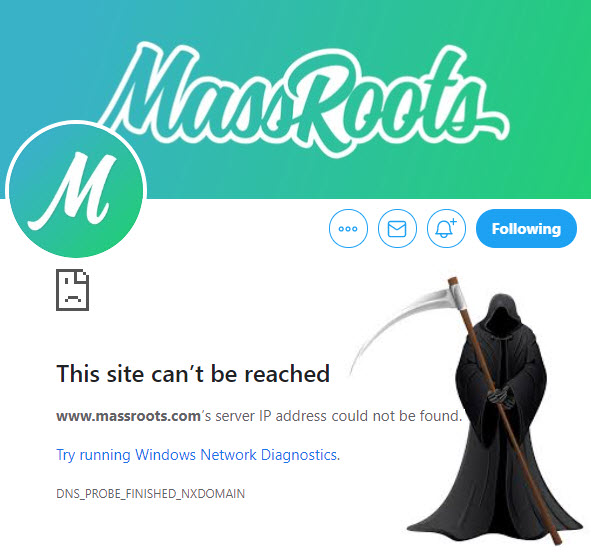Why is Everyone in Cannabis Going Out of Business?

The reverberations from the cannabis stock market crash, which are now slowly recovering thanks to new worldwide marijuana ETF’s being launched and having to buy baskets of cannabis stocks, is still being felt in the cannabis space. As we have discussed many times on Cannabis.net, it is extremely hard to make money in the cannabis space unless, well, you are actually selling cannabis. Our recent article on cannabis websites fighting for survival and how that traffic needs to be turned into cannabis orders, one way or the other, seems to be playing out. Let’s go over a quick summary of sites and businesses that are in economic distress.
Massroots – We covered their site being down for over 9 weeks and their app now longer working here, but Isaac has denied they are done and the site appeared back online a few weeks ago. Having burned through over $15 million in funding, Massroots is now down to 4 people working out of a WeWork in Los Angeles. With monthly expenses still in excess of $50,000 and only a few hundred dollars in revenue a month, it is hard to see how this project turns around without selling weed directly to consumers. Of course, that is not an easy task without a license and without the ability to ship THC through the Post Office or have it cross a state line legally. Traffic has slowly recovered, but to what end?
IS MASSROOTS DONE, MAYBE, MAYBE NOT, CLICK HERE.
Civilized – The upstart media company with over $8 million in capital infusion quickly crashed and burned with no real way to monetize their Internet traffic other than ad space. The site was sold for nothing but the outstanding debt and all employees were laid off before the holidays.
High Times – As we have argued in the past, you need to sell cannabis to create the revenue needed to keep the doors open. High Times seems to have figured this out as they have pivoted to buying dispensaries and doing licensing deals to get “High Times Dispensaries” open in Los Angeles and Las Vegas to start with, as they try and transition away from just being a media and events company. This will affect their public offering for sure as they are now “touching the flower” and dreams of a NASDAQ listing are now just that, dreams. After filling term letters with the SEC that they may not be able to continue operations, time will tell if new CEO Stormy Simon can turn this debt ship around, now sitting at over $105 million on the books, and create a path to profitability.
(1/28/2020) High Times would like it to be known the the $105 million debt that we reference is being legally challenged with the NY POST where the number orginates from after reading their SEC filings. The $105 million includes their crowd funding campaign and some other liablities that will be cleared up on a public offering. It is not $105 million cash owed to creditors, they sent over a copy of their latest filings to the SEC, click here to see them. Direct quotes are limited due to a legal proceeding against the NY POST currently going on right now.
Lift and Co – Appears to be done as well with mass layoffs and feelers out to investment groups to explore a sale or merger. The Canadian based firm went down a hybrid model of High Times and online menu management as their live events created revenue, but their digital offerings were underwhelming.
MedMen – the “chronically” challenged dispensary chain seems to have a new drama every week, and this week is no different. With massive debt and dilution to their stock, rumors say they are sending out letters now claiming they are unable to pay their bills and vendors on time. As of today, it appears that MedMen is contacting debt holders and offering $0.50 on the $1 on their debt in a restructuring deal in order to avoid a bankruptcy-like situation.
MEDMEN DISSTRESSED DEBT, LISTEN TO OUR INTERVIEW HERE.
EAZE – The Peter Thiel and Privateer Holdings backed cannabis delivery startup has burned through over $160 million dollars, yes, you read that correctly, and appears to be on the verge of running out of money. A series of poor decisions, poor leadership, and damaging lawsuits have left this once “Uber of Weed” on the verge of turning off the lights and needing bridge loans to keep the doors open.
LEAFLY and WEEDMAPS - (1/29/2020) - Add Leafly to the list of "big boys in the digital space" to slash payroll and staff as well, today. As first reported by Geekwire, Leafly has laid off 18% of their workforce today, a total of 54 people. This comes months after their biggest rival, and largest online marijuana portal, Weedmaps laid of over 100 people or 20% of their entire workforce. Thing it is easy to make money in the digital online cannabis space?
Is there a common theme to what happened? Yes and no, based on our interviews and sources a few common, but not uncommon, startup issues emerged with the leaders and management.
Hubris and Wasteful Spending
One common theme among the all the companies listed, especially those that saw inexperienced millennials get millions of dollars to deploy, was wasteful spending and arrogance. New offices, expensive locations, fancy cars, hiring too many people too quickly, and having to “look the role, be the brand” buried many of these funding rounds within the first few months. Instead of staying lean, concentrating on creating traffic, orders, and customers, many young CEOs went with fancy office space, expensive C-suite hirers, big media plans that created little revenue, and overall threw money down the drain in order to appear like “ballers and players”.
Capital Markets Dried Up
Due to the Federal classification of cannabis as a Schedule 1 drug on the Controlled Substance Act, traditionally fundraising avenues are not open to many cannabis companies. When the easy money from Canada dried up, and people started to focus on profits and not just engagement, the gravy train ended for many companies who really didn’t have a viable way to become profitable without either selling cannabis or being able to deal with companies that could sell cannabis in multiple regions or states. Many of these companies ran on the assumption that because you are in cannabis, the hottest market in the world, there would always be more funding around the corner. With unicorns like WeWork running into the same questions, the cannabis space soon followed.
Margin Compression on the Flower
With more competition from legal markets, and gray and black markets, the price of cannabis is under pressure, and will be under pressure for the next 25 years. As we covered here, Illinois, with the approval of recreational cannabis, will help create the largest black market in the world. Many of these cannabis companies set up their numbers based on the price of cannabis being X and margins and profits set accordingly. With taxation on legal products encouraging people to at least investigate the black market, the price of cannabis is turning out to be 50% of X. This certainly played a roll in the downfall of EAZE, as reports say they were taking in $800k to $1 million a day but only keeping a small fraction of that as profit. The legal dispensary model is under intense price pressure from the black and gray markets, and this has affected MedMen in a bad way, and High Times may soon discover that profits in the two most competitive markets in America, Los Angeles and Las Vegas, are elusive.
As profit margins drop, everyone along the supply chain gets squeezed, as everyone tries to find an area to “save a buck”. It is a domino effect into packaging, advertising, delivery services, etc. These renegotiated price changes effect every companies’ spreadsheets. If you are a packaging startup, you are now going to get $0.20 a plastic jar and top, not $0.33, sorry. Online ad deals are now $2,000 a month spends and not $4,000. Delivery and order referrers will now pay $1 and not $2.75. Margin compression has a domino effect and will affect everyone down the line if the Big Fish taking the actual cannabis order and running a debit card isn’t make the same profits as before or as expected on spreadsheets. Everyone will feel the pain.
US Federal Legalization is Taking a Long Time
Many companies built business plans around cannabis being federally descheduled or legalized by now. That would open the flood gates for investment funds to flow into the industry, as well as new orders and opportunities for business growth. With Hilary Clinton being a 98% winner at 5pm on Election Night according to the NY Times, we would be living in a different weed world right now. Not saying Hilary Clinton was a big pot head, but she was a Democrat and Bernie Sanders would have been somewhere in her cabinet, so we would have been in a different place with cannabis right now in America. Many companies swung big, and rightfully so when you have a 98% chance of being right, that cannabis would have been federally legalized by now. As with all businesses and startups especially, time is money, and that extended time to legalization has created a massive need for more money to make it to the finish line of marijuana prohibition ending.
CANNABIS COMPANIES CLOSING, READ MORE...
CANNABIS WEBSITES FOR SALE AT A DISCOUNT, READ MORE.









